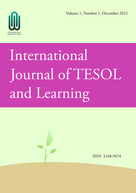


Volume 11 Issues 1-4 (2022-12-31)
Volume 10 Issues 3&4 (2021-12-31)
Volume 10 Issues 1&2 (2021-06-30)
Volume 9 Issues 3&4 (2020-12-31)
Volume 9 Issues 1&2 (2020-06-30)
Volume 7 Issues 3&4 (2018-12-31)
Volume 6 Issues 3&4 (2017-12-31)
Volume 6 Issues 1&2 (2017-06-30)
Volume 5 Issues 1&2 (2016-06-30)
This study first validated the EFLRAI (EFL Reading Anxiety Inventory) developed by Zoghi and Alivandivafa (2014) in the context of examining Chinese college students’ EFL reading anxiety. Using the validated EFLRAI, this study further examined the gender (i.e., male versus female) and major (English versus non-English) differences with a total of 1,041 college students from four universities across China. Both the construct validity and internal consistency reliability of the EFLRAI were examined; further, descriptive and inferential statistical analyses were conducted to investigate the gender and major differences in Chinese college students’ EFL reading anxiety. The results indicated that the EFLRAI was a valid and reliable instrument to measure Chinese college students’ EFL reading anxiety. Overall, these 1,041 participants experienced moderate EFL reading anxiety. However, there were no significant gender and major differences in their top-down reading anxiety (TRA), bottom-up reading anxiety (BRA), and classroom reading anxiety (CRA), respectively. Educational implications are discussed.
This study explores perceptions of the writing conferences from the students’ perspectives by examining the responses of both native-speaking students and ESL students at an American university. The results of this study reveal that students’ perceptions of writing conferences are influenced by their previous experience in writing, their writing process, and perception towards different sources of feedback. The results offer insight into how to conduct effective writing conferences.
Within the framework of generalizability theory, this study examined the impact of rater background on the variability and reliability of EFL writing classroom assessment. The writing samples included 60 compositions written by non-English major freshmen students in their final college English examination at a Chinese university. These compositions were rated by six independent raters holistically on a scale of 1-15 points. Data were analyzed using GENOVA. The results indicated rater background in language testing education and writing assessment experience did impact the variability and reliability of their holistic assessment of students’ English compositions. Implications for assessment policy makers as well as in-service and pre-service EFL teachers are discussed.
Although game based learning has been widely utilized by the military, education, marketing, and advertising sectors, its effectiveness as a learning strategy or training tool is still unclear (Ariffin, Oxley, & Suliman, 2014). The present study addresses this gap and examines the effectiveness of using game based learning in primary school instruction, particularly in Trinidad and Tobago where little research has been conducted at the primary and pre-school levels. This study employs a mixed-methods research approach and is made of (1) a quantitative questionnaire for teachers and (2) interviews with teachers to get their views/perspectives on the benefits or effects of game based learning to the teaching and learning processes. Data findings from the current study should begin to fill in the research gap with respect to using game based learning as an effective teaching and learning strategy in Trinidad and Tobago’s primary schools.